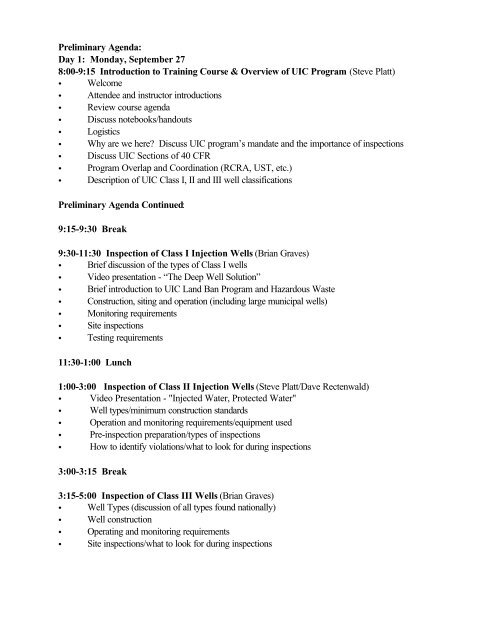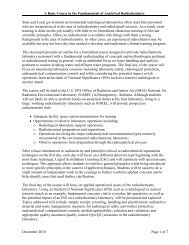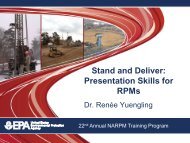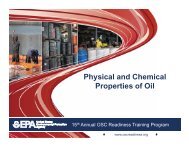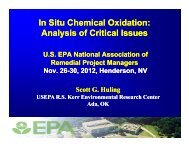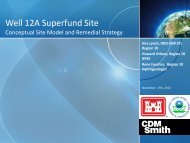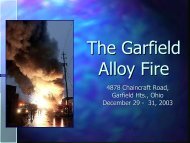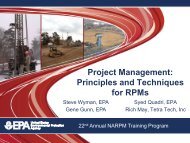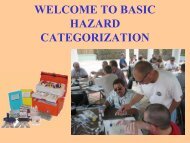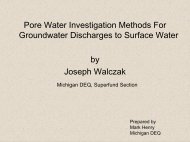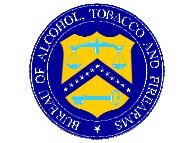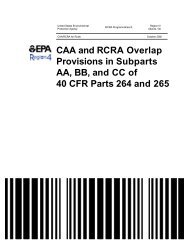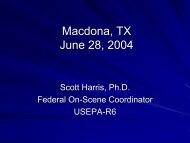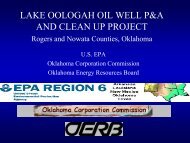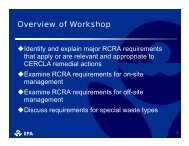UIC Inspector Training Agenda
UIC Inspector Training Agenda
UIC Inspector Training Agenda
- No tags were found...
Create successful ePaper yourself
Turn your PDF publications into a flip-book with our unique Google optimized e-Paper software.
Preliminary <strong>Agenda</strong>:Day 1: Monday, September 278:00-9:15 Introduction to <strong>Training</strong> Course & Overview of <strong>UIC</strong> Program (Steve Platt)• Welcome• Attendee and instructor introductions• Review course agenda• Discuss notebooks/handouts• Logistics• Why are we here? Discuss <strong>UIC</strong> program’s mandate and the importance of inspections• Discuss <strong>UIC</strong> Sections of 40 CFR• Program Overlap and Coordination (RCRA, UST, etc.)• Description of <strong>UIC</strong> Class I, II and III well classificationsPreliminary <strong>Agenda</strong> Continued:9:15-9:30 Break9:30-11:30 Inspection of Class I Injection Wells (Brian Graves)• Brief discussion of the types of Class I wells• Video presentation - “The Deep Well Solution”• Brief introduction to <strong>UIC</strong> Land Ban Program and Hazardous Waste• Construction, siting and operation (including large municipal wells)• Monitoring requirements• Site inspections• Testing requirements11:30-1:00 Lunch1:00-3:00 Inspection of Class II Injection Wells (Steve Platt/Dave Rectenwald)• Video Presentation - "Injected Water, Protected Water"• Well types/minimum construction standards• Operation and monitoring requirements/equipment used• Pre-inspection preparation/types of inspections• How to identify violations/what to look for during inspections3:00-3:15 Break3:15-5:00 Inspection of Class III Wells (Brian Graves)• Well Types (discussion of all types found nationally)• Well construction• Operating and monitoring requirements• Site inspections/what to look for during inspections
Day 2: Tuesday, September 288:00-10:00 Mechanical Integrity Testing (George Robin)• Standard pressure test• Radioactive tracer survey• Temperature survey• Noise log• Brief overview of other EPA approved alternative MITs• Other diagnostic tests- CBL/VDL- Cement evaluation tool10:00-10:15 Break10:15-12:00 Plugging and Abandonment (Harlan Gerrish)• Goal - Isolation of USDWs• Familiarization with field handbooks• Volume calculations• Well preparations• Plug installation methods• Plug types and locations• Remedial operations12:00-1:30 Lunch1:30-3:30 Inspection Protocols and Techniques (Roger Reinhart)• Objectives of inspections• Preplanning• Entry interview• File review• Record keeping and evidence documentation• Exit interviews• Inspection reports3:30-3:45 Break3:45-5:15 Tools for <strong>UIC</strong> Enforcement (Roger Reinhart)• How a well documented inspection can lead to a good enforcement candidate• Description of types of enforcement utilized• Use of Section 1431 authority• Case preparation• Follow-up• Section 1423 override and State/EPA joint enforcement
Day 3: Wednesday, September 298:00-10:00 Legal Requirements of <strong>UIC</strong> <strong>Inspector</strong>s (Joyce Howell) • Facility notification/access• Presentation of proper credentials/notices• Proper handling of warrants• Documentation of evidence• Handling of confidential information• Chain of custody (sampling and photographs)• Administrative hearing process/being a witness• Providing compliance assistance during inspection10:00-10:15 Break10:15-11:15 Field Safety (Dave Rectenwald)• Personal protective equipment• Considerations for personal safety• Hazards related to injection well operations- Safety during well drilling, treatment, and workover operations- Safety during routine inspections• Weather/habitat related hazards11:15-12:30 Protection of Underground Sources of Drinking Water (USDWs) (Steve Platt)• <strong>UIC</strong> program mandate• Definition of USDW and USDW exemptions• How do injection wells cause USDW contamination?• Protection of USDWs/Area of Review• Endangerment of USDWs/How can it occur?12:30-1:30 Lunch1:30-2:45 Introduction to Shallow Injection Well Program/Class V Wells (Mark Nelson)• Safe Drinking Water Act• Preventative Program• Key Concepts2:45-3:00 Break3:00-5:00 Defining Shallow Injection Well Systems• Subsurface emplacement of fluids• Well types• Good wells vs. bad wells• Industrial wells vs. non-industrial wells• Endangering wells vs. non-endangering wells• Permit vs. rule authorization• Program variability (Different methods to achieve the same objective)• Video - "Troubled Waters" (Automobile Service Station Waste Disposal Wells)
Day 4: Thursday, September 308:00-9:00 Getting Started• What are priority wells types?• What areas should be tackled first?• Geographic targeting• Sources of information9:00-10:00 Beating the Bushes• No substitute for field presence• How to obtain field presence with limited resources• Compliance inspection/information gathering• Gathering all relevant information/components of and inspection report form• Mapping/GPS/GIS – Letting the tools and technology work for you10:00-10:15 Break10:15-11:30 Compliance and Enforcement Followup• One size does not fit all• Conducting a mini risk assessment• Effective and efficient enforcement tools11:30-1:00 Lunch1:00-2:30 Table Top Exercises• Mock inspection scenarios and role playing2:30-3:30 Well Closure/Well Conversion• Guidance notification• Sealing drain• Removing dirt, etc.3:30-4:00 Course Wrap-up. Questions? Hand out take home exams.A brief overview of the exam will occur. Exams are open book and may be taken home.The exams should be completed and returned by November 1, 2004 to:Stephen PlattEPA Region 3SDWA Branch (3WP32)1650 Arch StreetPhiladelphia, PA 19103-2029If you should have any questions, please call Steve at 215-814-5464. A training certificate and your gradedexam will be sent to you through the mail upon successful completion of the course.


